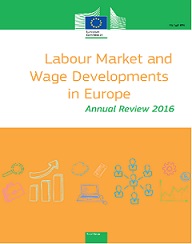Cette, Gilbert, Lopez, Jimmy, Mairesse, Jacques, (2016), “Labour market regulations and capital intensity”, VoxEu, 4 November With structural reforms of labour markets currently being considered in several countries, including in southern Europe, assessing their impact is vital. This column investigates the effects of employment protection legislation on a variety of production factors. Structural reforms that increase labour flexibility – that is, which weaken employment protection legislation – could have a favourable …Read More
Correcting The Euro’s Flawed Architecture Demands A Focus On Competitiveness Rather Than Productivity
Skouras, Thanos, (2016), “Correcting The Euro’s Flawed Architecture Demands A Focus On Competitiveness Rather Than Productivity”, Social Europe, 1 November On September 20, the European Council adopted a recommendation calling on the Eurozone member states to establish national productivity boards. This was an unfortunate decision. Not only did it kill a good proposal, it replaced it with a potentially harmful one. The useful initial proposal by the Five Presidents Report …Read More
Systemic Implications of Problems at a Major European Bank
R. Cline, William, (2016), “Systemic Implications of Problems at a Major European Bank”, Peterson Institute for International Economics, October Following the financial crisis in the United States and Europe, in the last several years banks on both sides of the Atlantic have been subjected to stronger supervision and regulation as well as tougher requirements on capitalization. Yet recent events suggest that vulnerabilities may remain in some of the largest financial …Read More
The New Fiscal Reality
Pisani-Ferry, Jean, (2016), “The New Fiscal Reality”, Project Syndicate, 1 November “When the facts change, I change my mind. What do you do, sir?” This, reportedly, is how Keynes replied to the criticism that he had changed his position on the policy response to the Great Depression. Pragmatism of this sort is not that common: policy views are often characterized by considerable inertia. Too frequently, today’s perspectives remain shaped by …Read More
The New View of fiscal policy and its application
Furman, Jason, (2016), “The New View of fiscal policy and its application”, VoxEu, 2 November The landscape of the fiscal policy debate has changed over the past decade, with academics and international organisations moving away from an ‘Old View’ of fiscal policy as ineffective. This column uses examples from the US and Europe to highlight the five principles of a ‘New View’ of fiscal policy, which increasingly appreciates that expansionary …Read More
The Legal and Operational Feasibility of a European Unemployment Benefits Scheme at the National Level
Coucheir, Michael, Strban, Grega, Hauben, Harald, (2016), “The Legal and Operational Feasibility of a European Unemployment Benefits Scheme at the National Level”, CEPS, 26 September The objective of this paper is to investigate the legal and operational feasibility of a European unemployment benefits scheme (EUBS) as a specific form of supranational automatic stabiliser. This investigation forms part of a broader multidisciplinary analysis of the EUBS, encompassing inter alia a study …Read More
Labour Market and Wage Developments in Europe – Annual Review 2016
European Commission, (2016), “Labour Market and Wage Developments in Europe – Annual Review 2016”, European Commission, 27 October The Labour Market and Wage Developments in Europe report analyses the labour market from a macroeconomic perspective. It provides an analysis of recent employment and wage developments, looking at the euro area and the EU as a whole in comparison with its global trading partners. The 2016 edition shows that job creation …Read More
Central Banks and the Revenge of Politics
Otmar Issing, (2016), “Central Banks and the Revenge of Politics”, Project Syndicate, 1 November The reputation of central banks has always had its ups and downs. For years, central banks’ prestige has been almost unprecedentedly high. But a correction now seems inevitable, with central-bank independence becoming a key casualty. Relevant Posts Shen, Dennis, (2016), “Central banks are facing a crisis of confidence – it’s time to reinvent global monetary policy”, LSE …Read More
The danger of Germany’s current account surpluses: Results of the CFM and CEPR Survey
den Haan, Wouter, Ellison, Martin, Ilzetzki, Ethan, McMahon, Michael, Reis, Ricardo, (2016), “The danger of Germany’s current account surpluses: Results of the CFM and CEPR Survey”, VoxEu, 27 October The October 2016 expert survey of the Centre for Macroeconomics (CFM) and CEPR invited views from a panel of macroeconomists based across Europe on Germany’s trade surplus, its impact on the Eurozone economy, and the appropriate response of German fiscal policy. …Read More
Investment for Sustainable Growth
D.Sachs, Jeffrey, (2016), “Investment for Sustainable Growth”, Project Syndicate, 31 October The big disappointment in the world economy today is the low rate of investment. In the years leading up to the 2008 financial crisis, growth in high-income countries was propelled by spending on housing and private consumption. When the crisis hit, both kinds of spending plummeted, and the investments that should have picked up the slack never materialized. This …Read More





